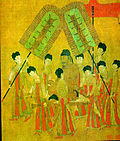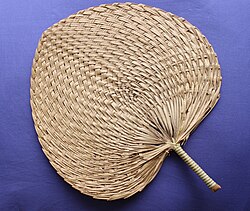Uchiwa
Tuan Shan, also known as round silk fan, is a traditional Chinese fan.[1] The Tuan Shan (団扇), a type of traditional handheld fan, was introduced to Japan from China during the Tang Dynasty (618-907 AD). During this period, cultural and artistic exchanges between China and Japan were frequent, especially through the missions sent by Japan to the Tang Dynasty. These missions brought back many elements of Chinese culture, art, and technology, including the Tuan Shan, which is called uchiwa in japanese.[2]
Tuan Shan is often used to create a breeze to keep cool in hot weather. They are part of Chinese seasonal traditions and are often given as gifts during these times. Originally, circular fan were made from big leaves and animal hair. The purpose was to purify and pray. Over time they have changed, and are now made from bamboo and paper. They may even be made of plastic and emblazoned with advertisements and are commonly freely given on the streets in large cities.[3] There are many kinds of pattern; during the Han Dynasty they were often decorated by famous calligraphers. The Tuan Shan subsequently spread to other parts of Asia, including Burma, Thailand, Cambodia and Sri Lanka, and such fans are still used by Buddhist monks as "ceremonial fans".[4]
History
The oldest Tuan Shan can be seen in the records of ancient China, as well as the wall paintings of Ancient Egypt.[source?] By the end of the Kōan (Muromachi period) period, uchiwa was made from bamboo and paper.
Function
Tuan Shan is used to fan cooking and to keep cool. Some people use it to purify disease. Tuan Shan is almost always used in summer festival dances.[source?]
Uchiwa Media
Replica of a short-handled bamboo fan, Warring States period Tomb
Female attendants of Emperor Taizong holding large oblong fans known as wumingshan or zhangshan
Ready For The Ball by Sophie Anderson
Lady with a Fan by Enrique Simonet
Lady with fan and shawl. Ulpiano Checa
References
- ↑ Nussbaum, Louis Frédéric et al. (2005). "Uchiwa" in Japan Encyclopedia, p. 738. at Google Books
- ↑ Fogel, Joshua. Japan and China: Mutual Representations in the Modern and Postmodern Era.
- ↑ Hughes, Felicity (July 16, 2010). "Big (only) in Japan? Free fans". The Japan Times. Retrieved November 14, 2024.
- ↑ "Buddhist Monks Ceremonial Fans". Thebuddhasface.co.uk. Archived from the original on April 23, 2013. Retrieved 2017-10-27.









